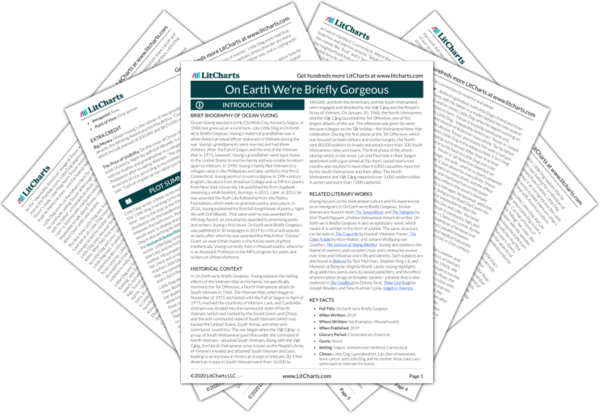Butterflies, specifically monarch butterflies, are repeatedly mentioned in On Earth we’re Briefly Gorgeous, and they are symbolic of memory, migration, and the importance of passing knowledge and lived experiences from generation to generation. Little Dog first mentions monarch butterflies in the very beginning of the novel, when he tells of the butterflies in Michigan during the fall that are beginning their migration south for the winter. From September to November, butterflies are everywhere and cover nearly every surface, but their survival is tenuous, and a single night of cold can quickly kill them off. The butterflies lay eggs on their journey south, and they never live to fly north again, but future butterflies automatically know the route because this knowledge in ingrained in them by their “ancestors.”
As an immigrant and a refugee, Little Dog and his family were forced to migrate in order to survive, much like the butterflies, and Little Dog equally relies on the lessons he learns from his mother, Rose, and his grandmother, Lan. Whereas the buffalo are symbolic of the blind following of one’s family in the novel, the monarchs represent a purposeful legacy, one that is essential for survival. Little Dog hopes that he and Rose will one day be “the opposite of buffaloes” and instead “grow wings and spill over the cliff as a generation of monarchs, heading home,” and this is precisely what happens at the end of the novel. As a thundering herd of buffalo charge at Little Dog, they suddenly turn into monarch butterflies and soar over his head. The stories and memories Little Dog cherishes, most of which come from his mother and grandmother, inform his life and guide his decisions, and in many ways, they help him to survive.
Monarch Butterflies Quotes in On Earth We’re Briefly Gorgeous
If we are lucky, the end of the sentence is where we might begin. If we are lucky, something is passed on, another alphabet written in the blood, sinew, and neuron; ancestors charging their kin with the silent propulsion to fly south, to turn toward the place in the narrative no one was meant to outlast.










